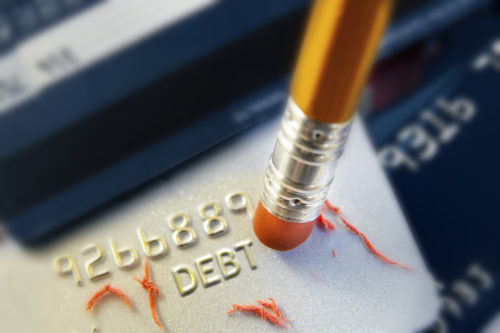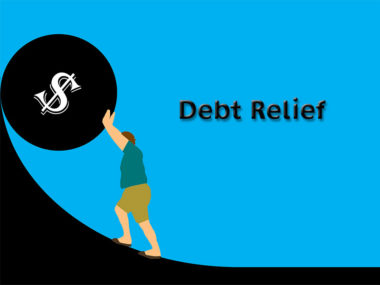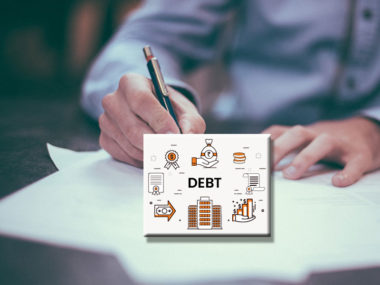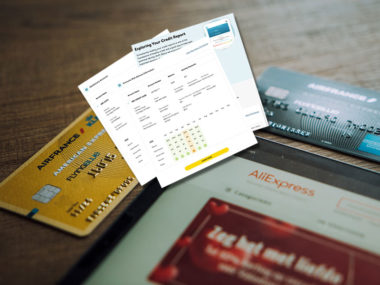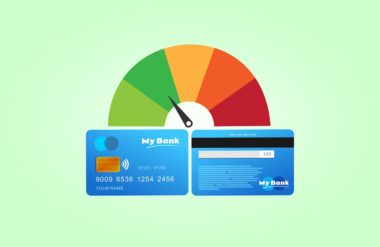Overwhelming credit card debt can be a difficult hole to dig yourself out of. Between high interest rates and juggling monthly bills, it can be financially overwhelming.
However, paying off your credit card debt fast is a possibility for everyone. Making a plan to pay off one card at a time, utilizing a balance transfer card, consolidating debt, consulting a credit counselor, or negotiating your debt with card issuers are all options when it comes to paying off credit card debt. It’s not going to be an overnight fix, and long-term success will involve a look into your credit card spending habits.
Table of Contents
Stop Spending
While you’re working on paying off your credit card debt, you’ll first need to stop spending money on your credit cards and work towards creating a budget that encompasses paying off your cards. Credit cards are not bad tools to utilize, but if you’re in credit card debt, it’s time to take a break from using them until you’re out from underneath them. It’s hard to control your debt if you first don’t control your spending. Find your bad financial habits and work towards fixing them in order to maintain your budget for the long term.
Re-teach yourself the correct way to use a credit card and how to spend with it wisely. Credit cards can be a great tool for building credit, but you also need to know when to pay your credit card bill and how to avoid interest. Even if your current credit card debt issues have affected your credit negatively, you can still obtain a credit card with poor credit after you’ve dug yourself out of this debt — it just might not be as simple as it once was. However, being diligent about your credit habits in the future will be key to keeping yourself out of overwhelming credit debit.
Focus on Paying Off One Card at a Time
If you have multiple credit card balances that you need to pay off, it can be challenging and overwhelming to tackle them all at once. You shouldn’t ignore minimum payments on any card, but you might want to focus on paying minimums on the rest of your cards while paying the balance down on one at a time in order to make it more manageable. Focus on debt repayment and not spending money in other ways. Work on frugal spending, pay more than your minimums, and make two payments a month (if you can) in order to pay down the debt faster.
- The Avalanche Method
The avalanche method of paying down credit card debt is to pick the card with the highest interest rate and pay the balance down on that one first. This method will obviously save you the most money by eliminating the highest interest payments first.
- The Snowball Method
The snowball method involves starting with the card with the lowest balance so that you see your progress faster. This can be really helpful in terms of supplying potential motivation to pay off your debt.
Use a Balance Transfer Credit Card
When high interest rates are making it nearly impossible to tackle any credit card debt in a timely fashion, it might be worth looking into the use of a balance transfer credit card. There’s typically a fee to do this, but it’s one way to consolidate your credit card debt onto one card and eliminate interest for a time while paying down the balance. It’s important to do the math and discover if the interest savings outweighs the balance transfer fee. It’s also important to note that applying for these cards will cause your credit to take a hit, so look into this option wisely, and don’t overuse it.
Consolidate Your Credit Card Debt
A balance transfer credit card is one way to consolidate credit card debt to gain the benefits of a lower interest rate and easier payments, but there are also other ways to consolidate your credit card debt. A personal loan, home equity loan, or home equity line of credit are other ways to accomplish credit card debt consolidation. However, be aware of the terms, interest rates, and long-term effects of each option.
- Personal Loan
Seek out your options in terms of a personal loan to pay off your credit debt. Depending on your situation, credit score, and loan qualification, you may find this to be the best option to turn your credit card balances into a personal loan payment instead.
- Home Equity Loan
If you own your home and have equity built, you may apply for a home equity loan to use to pay off your credit card balances. This form of debt consolidation can be dangerous when you consider the risk. When your home is your collateral, you run the risk of having your house seized if you can’t repay your loan.
- Home Equity Line of Credit (HELOC)
The major differences between a home equity loan and a home equity line of credit are the repayment policies and interest rates. The loan option is a fixed lump sum given to you with a fixed interest rate. A line of credit has a variable interest rate and balance — a lot like a credit card. Just like a home equity loan, a HELOC give lenders a lien against your home.
Consult a Credit Counselor
Credit counselors are a great resource for getting the ball rolling on your financial standing as a whole. Credit counseling organizations can advise you on money management, help you create a budget, and offer workshops. If you have questions on debt consolidation and what makes the most sense for you, they can help answer those questions. Though many of these organizations are nonprofits, that doesn’t mean all services are free or without high fees, so it’s important to do your research. Some credit counseling services are:
- The National Foundation for Credit Counseling
The NFCC is dedicated to improving people’s financial well being and has a national network of offices in every state.
- The U.S. Department of Justice
The U.S. Department of Justice has its own search tool to help find credit counseling services in America.
- Financial Counseling Association of America
FCAA member agencies assist hundreds of thousands of consumers annually with financial counseling services of all kinds as well as debt management services.
Negotiate Your Debts With the Credit Card Issuers
This option can be extremely helpful, or have a lot of negative effects associated with it. Discussing your payment issues with your credit card issuers is an option you have that might be extremely helpful. If you’re a good customer in a tight spot, you may be able to get suspended penalties, deferred fees, or qualify for a payment plan built around your situation. There may also be options to have your debt written off. This sounds like a godsend for those in difficult situations for credit card debt, but it can also be almost as bad as declaring bankruptcy in terms of destroying your credit.
Getting lost in immense credit card debt can happen to anyone. You can’t change the hole you’re in, but you can get yourself out and make changes that will help keep you out of the hole again. Whether you choose to pay off one card at a time, use a balance transfer card, consolidate your payments, consult a credit counselor, or negotiate your debt, you can find the best way for you to get out from under your credit card debt quickly. As long as you stop spending on those cards and focus on responsible spending, you are making important steps in keeping yourself free of overwhelming credit card debt in the future.
Image Source: https://depositphotos.com/
